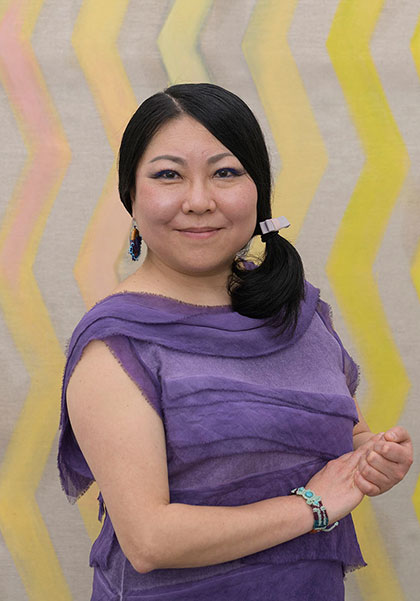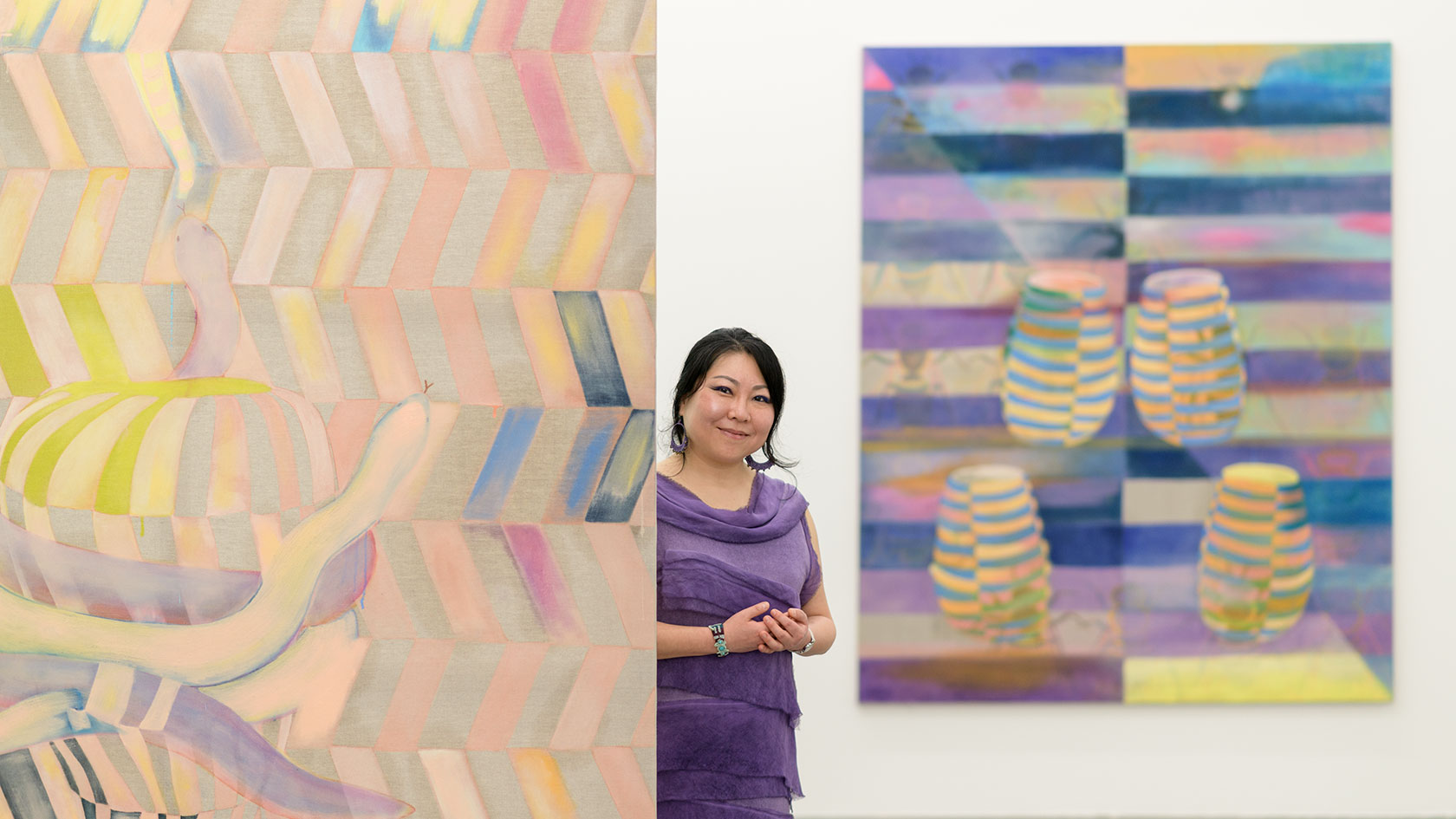Tango and Ethics
A small energetic woman in a smart Asian-style dress paces across the foyer of the DSI building to meet me, her footsteps click-clacking on the tiled floor. Ning Wang is an ethicist and political scientist within the Digital Society Initiative (DSI) at the University of Zurich. As a researcher, she is involved in various projects connected with ethically and socially responsible approaches to new technologies. Her specialist areas are robotics, autonomous systems and artificial intelligence.
I imagine she lives in a futuristic apartment with all the latest gadgets, but Wang quickly corrects my misapprehension: in private, she’s not that tech-savvy. What interests her, after all, are the ethical aspects of high-tech developments. And she takes her work here extremely seriously. One word that could be used to sum up Wang’s work and life is “bridging”. Ning Wang is a master bridge builder – connecting research and society, science and industry, NGOs and governmental authorities. She has just been appointed by the World Economic Forum to the Global Future Council on the Future of Technology Policy, an interdisciplinary network established to discuss the biggest questions about the future. The lightening-fast pace of technical innovation in recent years means there’s an urgent need for such discussions: robots are already helping out in care homes, AI is writing texts, emergency rescue drones are flying over crisis areas.
Profitable and responsible
Ning Wang is confident that the WEF members, even with their profit-oriented mindset, are open to hearing about ethical issues. The stakeholders have by now realized that innovation cannot only be driven by profitability, but must also proceed responsibly, explains the ethicist. The next question is how. “We need to ask how profitable goals can be achieved without damaging ethical and social values, and how responsible innovation can be supported and encouraged,” she says. This requires expertise from research. “Ethical values must be considered right from the early development stage of innovations. This needs to be addressed on a global level, for example via the WEF,” says Wang.
She pushes her dark hair away from her face and looks reflective. Wang realized early on that industry, public authorities and science were all speaking a different language. It was paramount that they work together, but they were talking at cross purposes. Wang knows both sides – prior to and between research stints in academia, she worked in start-ups, in private industry and in aid organizations.
It’s becoming clear that Wang likes to be in the thick of the action. “While I enjoy thinking about theoretical concepts, I’m no armchair philosopher – I do applied ethics,” says Wang. She looks at me with sparkling eyes and lifts up her hands. “I’m always asking myself, what’s the next step? How can we implement scientific findings? It’s a big challenge.”
Ning Wang grew up in Beijing in the 1990s. She studied international affairs in China, and planned to continue her studies abroad. Unfortunately, SARS put paid to her plan. Forced to rethink her plans, she launched her own successful start-up in Beijing offering business consulting alongside courses in language and culture for expats and diplomats. After suffering an accident, however, she decided to pursue her earlier dream. She headed to Europe – Sweden and then Norway – where she completed two Master’s degrees, one in applied ethics and another in political science. Wang laughs mischievously: “I’m the black sheep of the family.” Her parents don’t understand why their enterprising daughter can’t be satisfied with what she’s achieved and is always starting something new.
Start-up in Beijing
When Ning Wang goes back to China for visits now, she feels like a stranger in her own country. China has developed rapidly, at a much faster pace than Europe. Wang can barely keep up. “With regard to responsibility, I see China in a hopeful light,” says the political scientist. “The country is a strong player in the areas of technology and innovation, and it doesn’t want to be left behind on responsible development.”
Originally, Ning Wang only intended to stay in Switzerland for a short time. But when she narrowly missed out on a PhD grant in Norway, she took up a role at the World Health Organization in Geneva, where she assisted in developing ethical guidelines for dealing with tuberculosis patients. Thus she got to know the workings of the UN from the inside and developed a global outlook. After a foray into the world of business, where she worked on questions of business ethics but soon realized that profit-oriented thinking wasn’t her bag, she returned to the aid sector. Around that time, ethical attitudes in business began to become acceptable and even expected. More and more customers were demanding responsibly produced goods. In a sense, Ning Wang’s hour had come. At last the concept of ethical business was finding a footing in the real world.

I had a strict and rational upbringing in China and was therefore more comfortable using my brain than my body. Dancing softened me and opened me up.
Dancing tango in Argentina
After an intensive few years, Ning Wang needed some time out. This time a different continent called – South America. In Argentina, the technology specialist discovered her passion for tango. This passion shines through when Wang talks about her dancing hobby. “It was a completely new experience for me – I had a strict and rational upbringing in China and was therefore more comfortable using my brain than my body. Dancing softened me and opened me up.” It was the bridging of mind, body and soul. Since then she has made an effort to go tango dancing whenever she finds the time. At UZH, where she completed her PhD at the Institute of Biomedical Ethics and History of Medicine, she is known as “the drone lady”, laughs Ning Wang. But she would call herself the “ethics lady”. Wang’s research focuses on the ethical factors of drone use in humanitarian crises.
Cutting-edge technology and the aid sector
But how does this connection between cutting-edge technology and the aid sector come about? “Humanitarian organizations often work with tech firms,” explains Wang. There is high demand for sophisticated technologies, especially for use in topographically or logistically complex crisis regions. “Drones have long been used in the aid sector, but there are only vague regulations on their use,” says the ethicist. After the 2015 earthquake in Nepal, drones were used to map the region, and Wang investigated their use in a case study. “Alongside the advantages that technology brings, there are also potential risks,” she explains. These risks include unequal access, insufficient data security and lack of protection against misuse. Based on the Nepal case and another case in Malawi, where drones are used to transport medication between islands and the mainland, Wang developed an ethical framework for the humanitarian use of drones.
Wang currently spends a lot of time traveling to Geneva to meet with representatives of various humanitarian organizations. She is developing an ethics evaluation instrument for the humanitarian use of drones, designed for use in the field. In collaboration with NGOs and aid organizations, she has produced a tool taking users through a list of questions, including how and whether drone use complies with humanitarian principles, who bears responsibility, and whether their use is legal. The aim is to develop an instrument that enables users to make a judgment call within a fixed ethical framework, explains Ning Wang. The project brings research and practice together, satisfying the pragmatic ethicist. And if she can’t go tango dancing, how does the “ethics lady” maintain her equilibrium? “I do yoga!” She practices her asanas every day – including the bridge pose.
This article first appeared in UZH Magazine 2/2023
